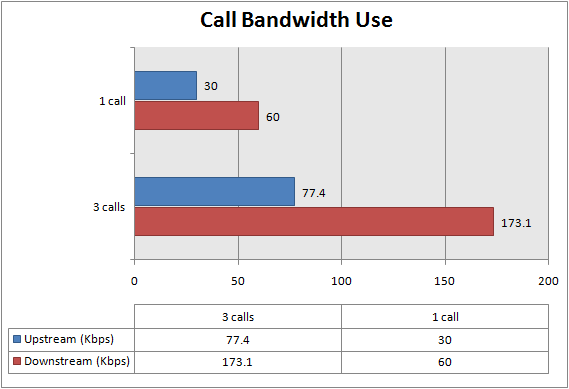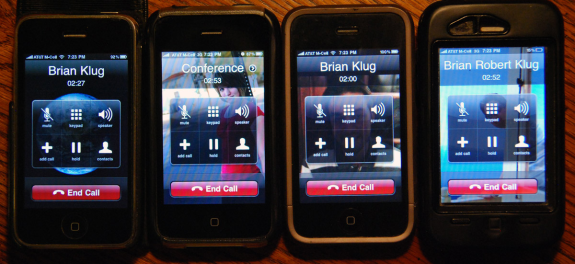AT&T 3G MicroCell: A Comprehensive Exploration
by Brian Klug on April 1, 2010 1:55 AM EST- Posted in
- Smartphones
- AT&T
- Microcell Review
- Mobile
Performance - Voice and SMS
Throughout the coverage radius, voice calls were basically as good as you'd expect them to be. Of course, right at the edge of the coverage radius there was noticable distortion and blocking like you'd normally expect. That said, calling works perfectly. I started with one device, and gradually added until I got to four devices.
Every device calling me - more calling in 2 minutes than I do in a month
There's really not too much to talk about quality wise, calling and SMS both work like they should when you're well within the range of the MicroCell. I did notice that call setup seemed to take longer occasionally, but don't have any explanation for it. There was also the occasional call that failed to setup, but again that was relatively rare. There wasn't any more perceptible audio lag than normal as well, something I've read callers definitely perceive occasionally.
I realized this was a perfect opportunity to get some real numbers about how much bandwidth a phone call actually uses. To do so, I set myself back up machine-in-the-middle style, setup a network bridge, and watched traffic. I initiated a conference call with three phones to each other in conference mode, and made some noise. This isn't as elegant as Anand's setup for call testing, but it gets the job done. I ran the test a few times with both one and two calls going, three just yielded the most smoothing. In practice, you'll see that bandwidth use is very uniform:

Three calls going
With a little math, we can really get a feel for how much bandwidth each call session is using:

This seems pretty reasonable, if a bit asymmetric. Then again, it's obvious that Cisco is being very careful about using limited upstream bandwidth, why not limit the return path just as much? Bear in mind that the same kind of downstream/upstream asymmetry applies across AT&T's 3G network, so these measures seem valid.
I also initiated call between two devices on the MicroCell and let it sit to see whether the call would drop after a long time - a number of people on the AT&T forums noted issues with longer calls. I successfully got up past a half hour, after which I terminated the call. I'm confident that it would have lasted should I have left it going.











63 Comments
View All Comments
Some1ne - Thursday, April 1, 2010 - link
So let me get this straight. I'm supposed to pay AT&T for access to a device that uses my own Internet connection to patch up holes in their network? That's just ridiculous. It's AT&T's inadequate network coverage that makes these devices necessary in the first place, and now they're actually trying to profit off of having poor network coverage. Pretty much removes any incentive for them to improve their network, now doesn't it?These devices should be provided free of charge, as a "sorry you can't actually use the network that you paid to access" kind of token. Anyone who pays for one of these is just giving AT&T one more reason not to fix their coverage issues.
Alexstarfire - Thursday, April 1, 2010 - link
I rather agree. Makes you wonder what they actually do with all the money they receive monthly. Also means that if you purchase one, much like how it should be if you use an unlocked phone, that your monthly bill should drop in price. Except in this case if they are using your broadband connection then it should practically be free since it provides next to no burden on them, though I don't know what happens after it goes through the connection.therealnickdanger - Thursday, April 1, 2010 - link
How do you know that the actual cost of the device and the technology driving it isn't already subsidized by your bill? Perhaps you're only paying 10% of what it really costs.vol7ron - Thursday, April 1, 2010 - link
Even if a subsidy were included, which would only cover some (not all) of the costs, the fact that people have to pay anything more for it is ridiculous given the nature of what a cell company is: a service. Cell phone companies are in business for one reason and by making you pay anything more to receive the core product is truely sad.There are other companies, like Cisco, that have built their own repeaters and Mobile-to-VOIP products, which I commend, because they are a technology company not providing the service. They're taking something bad, that they don't have control of, and making it bearable. Cell phone providers are at the other end, they have full control but are making you pay more, even though you aren't getting the initial benefit of what you're paying for in the first place.
zinfamous - Thursday, April 1, 2010 - link
This is kind of where I sit with the argument. a one-time ~$150 cost to the customer *may* be cheaper in the end, than having a network-wide upgrade that increases costs across all customers, paying more and more per month.Perhaps it also improves access to those willing, and needing increased network performance, paying a bit more for the premium, while those customers with little need for the bandwidth go on about their normal use, paying what they always have. It's like...a single-payer network structure! :D
DoeBoy - Thursday, April 1, 2010 - link
IT seems to me some people forget that companies are in business to make money. This is a great way for ATT to make a lot of extra money. I live in a rural area and i complain all the time in an area they say has coverage that does not at all. While this would aid me in getting better service it also would require me to pay for an inet connection which is not covered by att. Clearly they aren't a moral company when your service is so bad you have to have a product that uses some other technology(a la internet) and then charge the person not only for that product that gets you service but not even lower your bill since you technically arent using their towers really at all under this sucker. Clearly Verizon and ATT are both big 500lb gorillas. In europe its much easier to get a cheap cell phone deal and coverage. Clark Howard seems to think ATT and Verizon are going to end up being more corporate and smaller companies like t-mobile, cricket, metropcs and what not will fill in the void for the regular consumer.Some1ne - Thursday, April 1, 2010 - link
The problem is that when you look at the pricing matrix, not only is there a fixed upfront cost, there are also recurring monthly fees. It doesn't matter how much the up front cost is subsidized. The monthly fees mean that sooner or later, AT&T will be turning a profit on these devices.And even worse, the fees are higher if you're not already using AT&T as your ISP and/or land-line provider. That makes the least sense out of anything, since if you have a different ISP, then by running the femtocell you are completely unburdening AT&T's network, and dumping all the work onto someone else. The get to sell your bandwidth to someone else, and charge you more while doing it.
taltamir - Thursday, April 1, 2010 - link
in computers, the technology is made mostly of sand... it costs practically nothing.It is the technology you are paying for...
However there is one major component here, AT&T themselves look at it as a "cost cutting method"... in other words it is intended to cost them LESS, aka, they are making MORE of a profit on you if you get one of those then without.
The whole thing is absurd. You pay hundreds of dollars for a black box device with tamper protection and absolutely horrid performance (compared to wifi), then you pay a monthly fee for the privilege of using said device...
they should just put wifi in every device and have wifi be free (but they usually charge a monthly fee for that privilege as well)
ant1pathy - Friday, April 2, 2010 - link
You are, of course, welcome to change carriers. If you feel the service you are recieving is subpar and another carrier would be better for you, the termination fee is probably less than the cost of the box. If you're continuing to pay for a service that does not meet your needs and you can't really use, then you are the pefect consumer.Wolfpup - Wednesday, April 21, 2010 - link
I completely agree. It's absolutely nuts IMO.